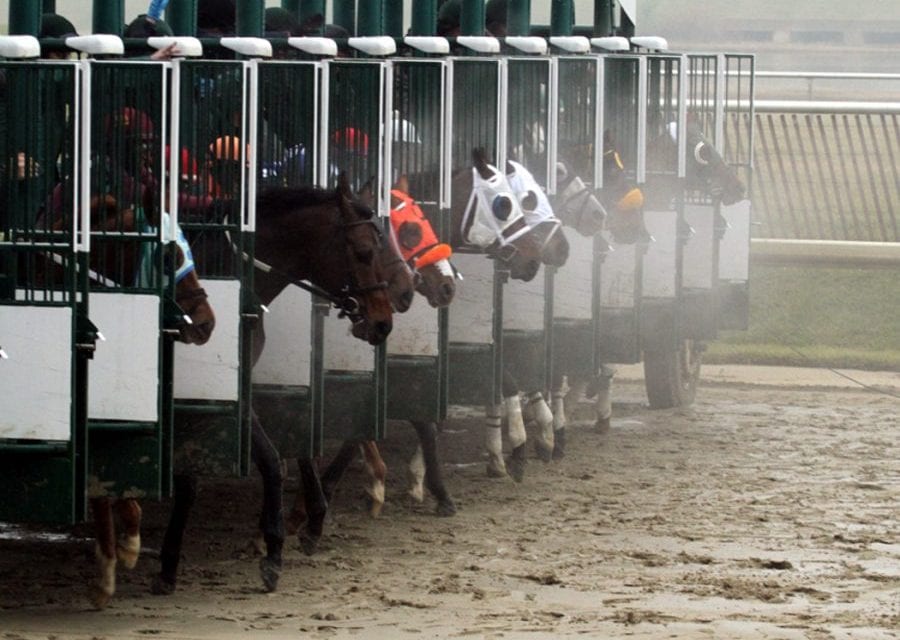by Frank Vespe
The states are making steady progress towards uniform medication rules — but exactly how meaningful that progress is appears to be the question.
And, it seems, the states themselves may need to play a more active role in the future.
That was the tough-to-miss message of a pair of events that took place Tuesday.
First, the the Racing Medication and Testing Consortium (RMTC) issued a release lauding progress towards national uniform medication rules. Nine states have now fully adopted RMTC’s model rules recommendations, which include a controlled therapeutic substances list, third-party administration of furosemide (Lasix), a multiple medication violation penalty system, and the use of an RMTC-accredited laboratory to test samples.
It’s that last that’s the cause of the present unpleasantness.
On the same day, the Indiana Horse Racing Commission (IHRC) — Indiana being one of the nine all-in states — issued a scathing report documenting what it called “across-the-board failure” by Truesdail Laboratory, one of RMTC’s five currently accredited labs. The Commission had earlier terminated its contract with Truesdail because the lab had missed three positives — but those three turned out to be only a relatively small piece of a larger problem.
From March 27 to May 5 — a period of 26 racing days — the IHRC said, the California-based laboratory missed seven violations, including what would have been a Class 1 positive for Methylphenidate (Ritalin), a central nervous system stimulant. Class 1 substances, according to the RMTC, are “drugs that have the highest potential to affect performance and that have no generally accepted medical use in the racing horse.” They carry penalties including disqualification of the horse and a minimum one-year suspension for the trainer.
Under Indiana’s quality assurance program, the state sent samples both to Truesdail and to Industrial Laboratories in Denver, which served as the audit lab. In the event that the two labs issued conflicting reports, a split sample was then sent to one of two “referee labs,” LGC Science in Kentucky or the University of California-Davis.
Truesdail, said the IHRC, did not record a single positive test during the 26-day period. But Industrial found seven positives, including four for corticosteroids, one for the anti-inflammatory DMSO, and one for the muscle relaxant methocarbamol, as well as the one for Ritalin.
The referee labs have confirmed six of Industrial’s seven positives, including that for Ritalin, with the seventh currently pending.
“The failure of the primary lab to find drug violations precluded the Commission staff from prosecuting what otherwise would/should have been a number of positive tests,” the IHRC report, signed by executive director Joe Gorajec, noted. Most, if not all, of those would likely have resulted in at least disqualifications and purse redistribution.
Of course, this is a much-larger-than-Indiana problem.
For one thing, it raises troubling questions about the accreditation process itself. According to the Paulick Report, RMTC executive director Dionne Benson said that the organization is reviewing Truesdail’s accreditation — but to record a monthlong 0-for does force one to wonder what the company was doing, and whether the RMTC should have known.
What’s more, four mid-Atlantic states — Delaware, Maryland, New Jersey, and West Virginia — use Truesdail as their primary testing lab. One of those, Delaware, had previously used LGC but found that lab’s turnaround times to be unacceptably slow, taking up to seven weeks in some circumstances.
Two of those states, Delaware and New Jersey, told The Racing Biz last month that they would, in light of the developments, implement their own quality assurance programs. But Maryland Racing Commission executive director Mike Hopkins demurred at the time. “We don’t have any concerns at this point, but we’ll watch what’s going on,” he said.
In light of the latest news, there’s no question that it’s time to be concerned.
The RMTC’s accreditation guidelines require each lab to participate in an “external quality assessment program” — a requirement that perhaps should be bolstered.
Moreover, Indiana’s experience demonstrates that it behooves the states to implement their own, real-time quality assurance programs. It’s unfortunate that Indiana missed seven positives in a little over a month; the problem would likely have been worse in six months, or a year.
Doing the program right will cost money, of course. The IHRC paid Industrial nearly $24,000 for its 26 days of audit testing and, in fact, is currently developing a different auditing method it hopes will be more cost-effective and, perhaps, efficient.
But even if it is expensive, since the failure by laboratories to detect prohibited substances would render the whole uniform medication endeavor moot, that figures to be money well spent.









I and many other owners / trainers have doubted the labs process for some time. But there is no recourse w/o true cooperation from the State because you obviously can’t use banned substances just to make a point. And even if you did, there would be no way to do a validated split test. And no positives in 2014 until a quick burst of positives at the end of the year before the points system went into effect??!! VERY frustrating.
agreed, and that’s why we need a quality assurance process in place. There’s no true program if the testing doesn’t work. (Minor quibble: the guys who got those end of year positives actually did get points on their records).